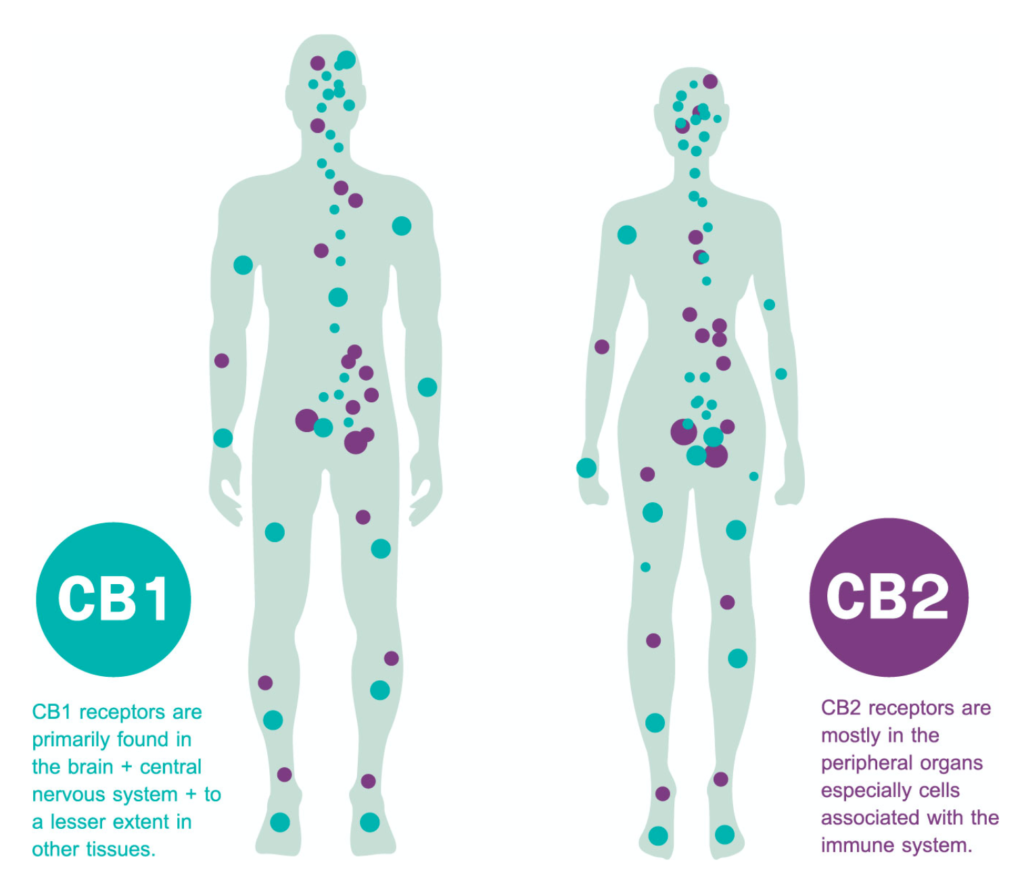If you are someone who takes CBD oil, it would be useful for you to understand the endocannabinoid system. Or any cannabis products for that matter. Therefore, in this post, we are covering everything you could possibly need to know about the endocannabinoid system and how CBD interacts with it.
What is the Endocannabinoid System?
The endocannabinoid system (ECS) is a relatively new discovery that was identified by researchers who were exploring THC. The ECS is a complicated cell-signaling system that works with cannabinoids, which are compounds found in cannabis.
Experts are still trying to fully understand how the ECS works but what we do know is that it plays a major role in regulating a range of functions and processes like sleep, mood, appetite, memory, and reproduction.
The ECS exists and is active within your body even if you do not use any cannabis. Below we will discuss more about the ECS and how it works and interacts specifically with THC and CBD and how it presents a unique opportunity for a variety of health conditions.
The Bottom Line: The endocannabinoid system is located throughout the entire body. It works with cannabinoids to regulate important bodily functions.

How Does the ECS Work?
The ECS includes three main components which are the endocannabinoids, receptors, and enzymes.
The endocannabinoids are molecules that are produced by your body. They are similar to cannabinoids but they are made in your body. There are two main cannabinoids and one of them is anandamide which you might be familiar with. They help keep things running smoothly and are produced as needed.
The receptors are found throughout your entire body. Endocannabinoids bind to them in order to signal the ECS to do something. There are two main receptors including CB1 which are mostly found in the central nervous system and CB2 which are mostly found in the peripheral nervous system.
However, the cannabinoids found in cannabis like THC and CBD can also bind to these receptors and mimic the actions of the endocannabinoids. They are also often referred to as phytocannabinoids as they come from a plant.
Endocannabinoids can bind to either of the receptors. The outcome of this action will depend on where the receptor is located and which endocannabinoid it binds to. Therefore, when a CB1 receptor is activated in the spinal nerve it can help to lower pain. Meanwhile, when a CB2 receptor is activated in an immune cell it could signal inflammation in the body.
There are also enzymes that are responsible for breaking down endocannabinoids once they have completed their job. There are two main enzymes that are responsible for this but they are not relevant to this particular discussion.
The Bottom Line: The ECS works by activating receptors that are spread across the body. It also has cannabinoids that act on them and enzymes to break them down.
What are the Functions of the Endocannabinoid System?
The ECS is complicated and experts have not yet discovered everything there is to know about it. However, what we do know is that it works on the processes involved in metabolism, digestion, pain, inflammation, mood, cognition, memory, sleep, cardiovascular health, muscle formation, motor control, bone growth, liver function, reproduction, stress, and skin function.
These functions contribute to homeostasis or the internal balance of the body. The goal is to bring the body back into the normal state for a stable internal environment. If there is any kind of illness going on, for example, the ECS works to return the body back to normal operation. Experts believe that this is the main purpose of the ECS.
The Bottom Line: The ECS works to bring the body back into balance. It does this by controlling a number of different and important functions within the body.
How Do THC and CBD Interact with the ECS?
THC is one of the main cannabinoids found in cannabis and comes with psychoactive properties, meaning that it can get you high. THC interacts with the ECS by binding to receptors just like endocannabinoids. It can bind to both CB1 and CB2 receptors which allows it to have a range of effects on your body and mind, some of which are not pleasant.
While THC can help to lower pain and stimulate the appetite, it can also result in anxiety and paranoia in others. Therefore, you should always check the amount of THC that your CBD oil contains in order to avoid any unwanted side effects. Luckily, you do not need to worry about this with any ICARIA products as we only use a CBD isolate to avoid this exactly.
The other major cannabinoid that is of major interest to us is cannabidiol or CBD. Unlike THC, CBD does not get you high and often does not have any negative effects. Experts are not entirely sure how CBD interacts with the ECS. However, they do know that it does not act on the CB1 and CB2 receptors in the same way that THC does.
It is believed that CBD works by preventing endocannabinoids from being broken down. This allows them to have more of an effect on your body. It is also believed that CBD binds to a receptor that has not yet been discovered. That being said, research suggests that CBD can help with pain, nausea, and a number of other symptoms related to multiple health conditions.
The Bottom Line: It is unclear exactly how CBD works at the moment. But we know that it has widespread benefits without any negative side effects, unlike THC.
What is Endocannabinoid Deficiency?
There is a theory referred to as endocannabinoid deficiency that suggests low levels of endocannabinoids in your body could result in ECS dysfunction. This can further contribute to certain health conditions.
This could also explain why some people develop migraines, fibromyalgia, and irritable bowel syndrome. None of these conditions have a clear reason for the disease. They are also often resistant to treatment and sometimes occur alongside each other.
If endocannabinoid deficiency does play any kind of role in these conditions, targeting the ECS by supplementing with CBD could be a possible solution. The idea is that with a boost of cannabinoids you can regulate the ECS. Of course, much more research is needed to confirm this theory.
The Bottom Line: There is a belief that endocannabinoid deficiency could be the reason for particular health conditions. CBD could help with this.
The Final Word
Regardless of what we currently do not know, the ECS still plays a big role in keeping bodily processes stable. For this reason, cannabinoids like CBD can effectively work where other solutions have not been as worthwhile.
The benefits of CBD seem to be widespread and far outweigh any possible risks, unlike THC. Therefore, this makes CBD a safe, natural, and effective solution against numerous health conditions for those looking at other options.







